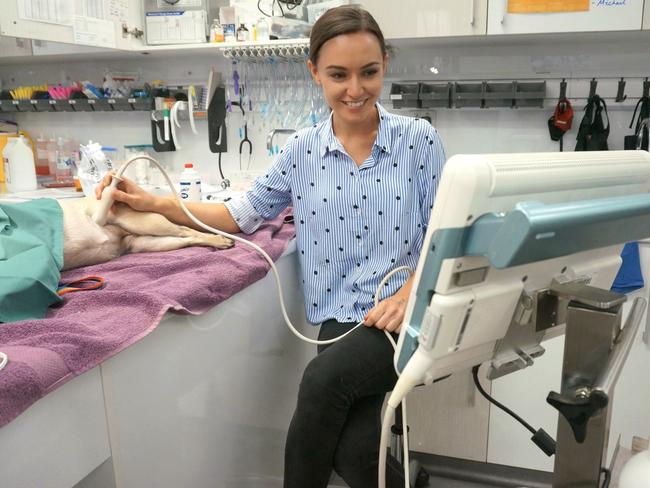Brisbane veterinarian Kate Bruce says canine and feline coronavirus has been around for years
This is what to do if your beloved dog or cat is diagnosed with the animal strain of coronavirus.
QLD News
Don't miss out on the headlines from QLD News. Followed categories will be added to My News.
A BRISBANE veterinarian has tried to assuage any fears cat and dog owners have should any of their pets be diagnosed with the coronavirus.
In a post to her 27,000 followers on her @kate.the.vet Instagram page, Small Animal Veterinarian Kate Bruce said there was no reason to be alarmed should a pet be diagnosed with coronavirus.
“Coronaviruses (yes, plural, there are MANY different forms) have been around long before the current type ‘COVID-19’ hit headlines (sic)” she wrote.
“Both dogs and cats can contract species-specific types of coronavirus, with individuals typically developing mild diarrhoea symptoms, and cats potentially developing the more serious disease, Feline Infectious Peritonitis.
South Korea added to Australia’s travel ban
Best memes from toilet paper panic buying
“The majority of dog and cat coronavirus cases self-resolve. These are viruses that vets have seen and managed for years.”
Dr Bruce, 27, said both canine coronavirus and feline coronavirus had no relation to the new human strain dubbed COVID-19 that was recently discovered in China.
“At this stage, there is no evidence that cats and dogs can become sick with, or spread COVID-19,” she said.
This was despite one dog in Hong Kong returning a “weak positive” result for COVID-19 on February 26.
It is believed the Pomeranian contracted it from its 60-year-old owner in what is believed to be the first known human-to-animal transmission, according to health officials in Hong Kong.

The dog showed no signs of infection and remains in quarantine.
Dr Bruce said that dog was still subject to further testing, but there was no suspicion that dogs can infect people.
Canine coronavirus disease is a contagious intestinal infection in dogs and puppies and is part of the Coronaviridae family.
Dr Bruce told the Courier Mail she decided to write the post after reading other posts where a number of people asked if they should euthanize their dogs or cats because of the virus.
“Then mum said she saw a post about greyhounds infected with canine coronavirus,” she said.
“There is a coronavirus contracted by dogs and cats but it’s species specific.
“In dogs in particular, it usually causes mild diarrhoea. Sometimes they can be infected without showing symptoms.”
Dr Bruce said vets usually come across the virus in dogs or cats that have spent time in boarding kennels, pounds or with felines, come from multi-cat households.
“In cats, the coronavirus can sometimes mutate to a virus called Feline Infectious Peritonitis or FIP.
“FIP is particularly nasty and kills most infected cats.”
Dr Bruce emphasised canine and feline coronavirus had been around for years, and was a different strain from the COVID-19.
She said hundreds of diarrhoea samples from sick dogs were tested every year, with about one quarter of them coming back positive for coronavirus.
“With feline coronavirus, between eighty to ninety per cent of cats in multi-cat households will show positive at some point,” Dr Bruce said.
Canine coronavirus has been detected in five to 18 per cent of dogs with diarrhoea, according to the Veterinary Information Network.
Dr Bruce said infected or concerned pet owners should quarantine their dog or cat should they contract the animal version of coronavirus.
“There is absolutely no risk of transmission to people,” she said.
She said cats could not spread it to dogs and vice versa.

“It’s spread by the faecal-oral route … and they can shed the virus for a couple of weeks after being infected,” Dr Bruce said.
“There is no specific treatment for it. If an animal shows symptoms, isolate them to stop it from spreading.”
In a statement posted to their website, a spokesman for Hong Kong’s Agriculture, Fisheries and Conservation Department said, despite the Pomeranian’s test results, there was “no evidence” that pets could be a source of the virus or that pets could be infected with the COVID-19 strain of the virus.
“Apart from maintaining good hygiene practices, pet owners need not be overly concerned and under no circumstances should they abandon their pets,” the spokesman said.


